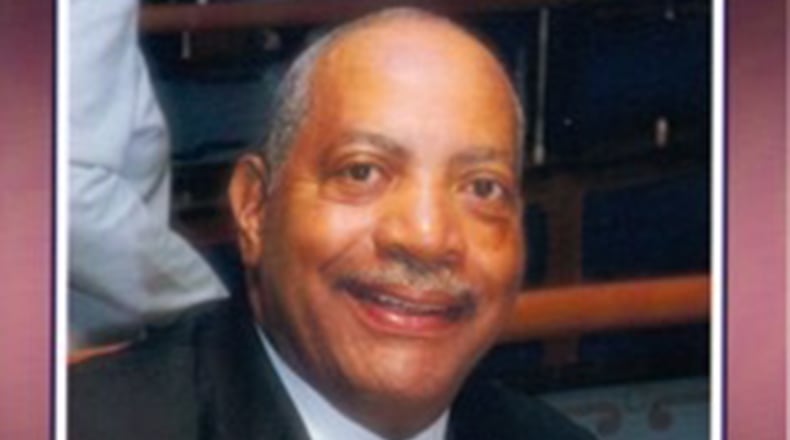Longtime civil rights champion Frank Bates got a long overdue apology Saturday. And it came on the last day of his life.
In 1965, while leading a move to integrate schools in tiny Crawfordville, Ga., the 17-year-old Bates had his jaw broken.
Fifty-two years later, his attacker apologized.
“The man said he’d been looking for Frank for several years,” Bates’ sister, Dorothy Bates Kendrick, said. “He said he was so sorry, and Frank forgave him. They hugged, and Frank took a picture. It was very emotional, and it was closure for that guy.”
Hours later, Bates collapsed and died.
His family said he apparently had a massive heart attack. He was 69.
A public viewing and memorial service for Bates will be Thursday at Fairfield Baptist Church, 6133 Redan Road, Lithonia, beginning at 6 p.m. Funeral services will be Saturday at noon at Greater Level Hill Baptist Church in Crawfordville.
Bates grew up on a farm in Crawfordville, home of Alexander Stephens, a Georgia governor, congressman and vice president of the Confederate States of America.
Bates attended the county public schools and became involved in the civil rights movement, protesting the firing of five black teachers and advocating the schools’ desegregation.
After leading a student walkout, he was bused to an all-white school in a nearby community. On his third day at the new school, he had his jaw broken.
Hours before his death Saturday, Bates called Rick Dent, former Gov. Zell Miller’s former spokesman, to talk about the meeting he’d just had with his long-ago attacker.
“I’ve probably never had such an intimate conversation in our 25 years of friendship,” Dent said. “It was unique and special to both of us. Then to receive a call hours after and be told he’d died, it’s just an incomprehensible sort of circumstances like I’ve never experienced.”
That attack in 1965 altered Bates’ life. His family decided that, for his safety, he should finish high school in Atlanta. He attended Booker T. Washington High School while holding down a full-time day job and then went on to DeKalb Junior College.
After serving in the military, he received his bachelor’s degree in history and political science from Fort Valley State University, where he established many lifelong friendships and returned annually for homecoming, family members said. He studied urban politics and economics at Georgia State University and obtained his law degree from Atlanta Law School in 1977.
Bates began a 30-plus year career in government with the district attorney’s office in Thomson. Later, he would work for two governors – Joe Frank Harris, representing state workers in employment discrimination cases, and Miller, as executive assistant for community relations. Harris also appointed him deputy director of the state Democratic Party.
Keith Mason, Miller’s chief of staff, said Bates was “very loyal, dependable and honest. “As chief of staff, I never had to worry about his work or his loyalty to the governor.”
Miller was working to get more African-Americans in key jobs in state government, including naming Leah Sears Collins to the state Supreme Court and Al Scott as state labor commissioner. “Frank was very instrumental in what we did,” Mason said.
On April 30, 1992, while Bates was working for Miller, students protesting the acquittal of four Los Angeles policemen in the Rodney King beating stormed downtown Atlanta, overturning a dark sedan outside the Georgia Capitol.
The irony was not lost on Bates that they’d chosen his car. He wasn’t happy with the heavy damage to his car but had to laugh, Mason said.
“He took it all in stride. He could always find something positive to say in an unfortunate situation or humor in a not-so-pleasant circumstance.”
Bates resigned from Miller’s administration after some tax troubles. He acknowledged the mistakes and went on to serve as director of workforce development for the state’s system of technical colleges, helping to launch the Georgia Fatherhood Initiative.
That program, which offers job training and help finding employment, is considered a national model, said Mike Thurmond, CEO of DeKalb County and former director of the Georgia Division of Family and Children Services.
Thurmond said he and Bates enjoyed a decades-long friendship, spurred by their similar backgrounds. Bates “had a heart of gold and was a friend, dedicated community worker, brilliant political strategist and a person who could be counted on,” Thurmond said. “He lived an exemplary life by example.”
Melvin Johnson, chairman of the DeKalb County Board of Education and a lifelong friend, said Bates was “a friend to just about everybody. “I really don’t know anyone who disliked him,” Johnson said. “There’s sadness that I won’t see him again. But his spirit will be with us forever, and that’s the rewarding thing,” Johnson said.
Bates, who was divorced, had a large and close extended family.
If Bates “was an average man in stature, he was a giant in character and personality,” nephew Maurice Bates, an Atlanta Police Captain, said.
“He was a person who loved his family, which was the core of his existence,” he said. “He was everything to everybody, and he always had time to lend support to me personally, surely all my life.”
Bates “was the catalyst in our family who encouraged my cousins and I to attend college and always strive to be better,” niece Teresa Kendrick said.
Sister Dorothy said Bates was “more than a brother – he was my rock and my protector.” She said Bates helped her raise her children after her divorce. Later, after the death of their mother, who sister Dorothy cared for, Bates made sure she had the money to travel and enjoy life, she said.
In 2015, Bates wrote and self-published “From Level Hill to Capitol Hill,” a book about his life, in which he said he subscribed to an old saying shared by his former boss, Zell Miller: “If you ever see a turtle sitting on a fence post, you know he didn’t get there by himself. Somebody had to help him.”
About the Author
Keep Reading
The Latest
Featured



